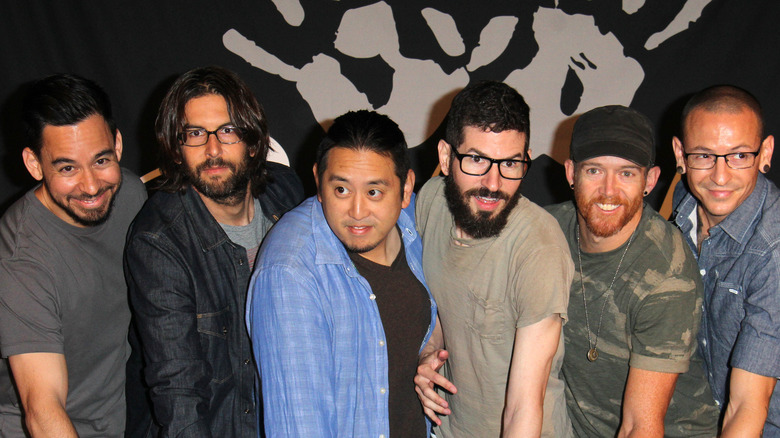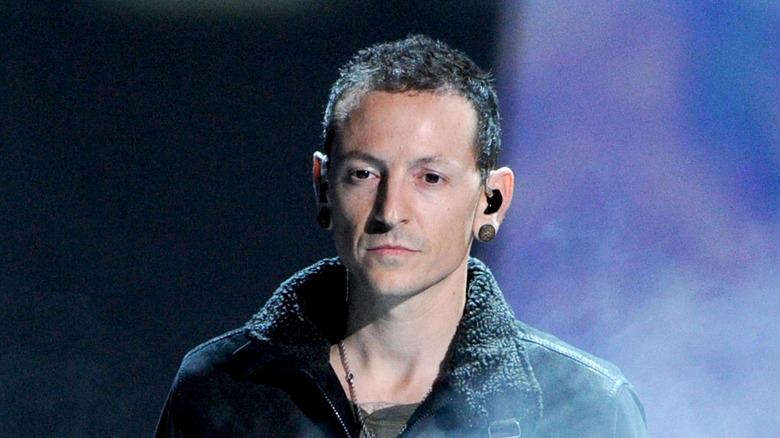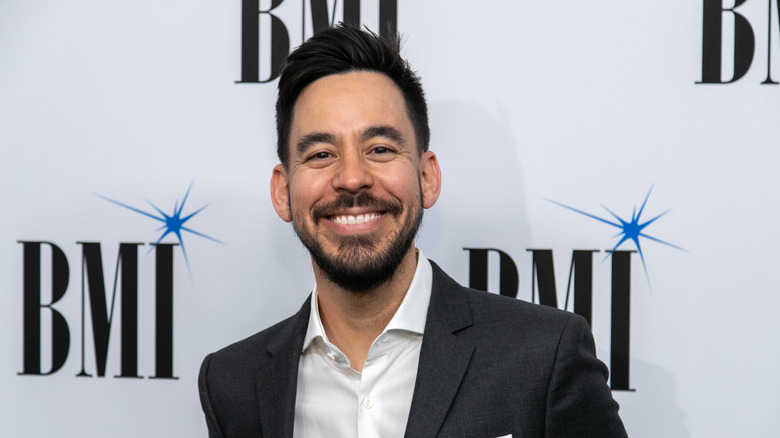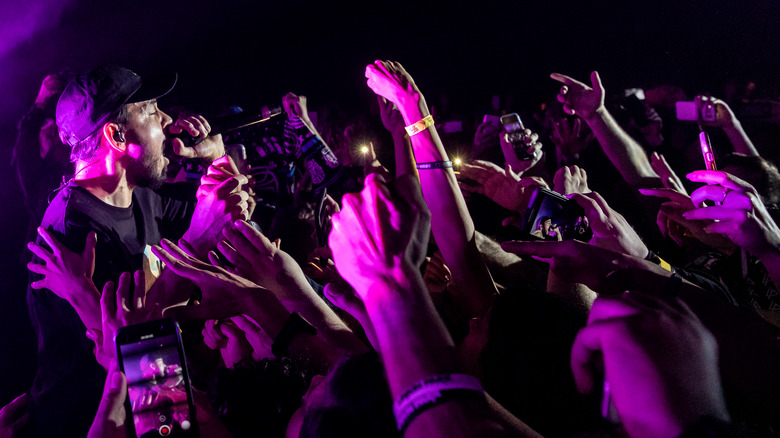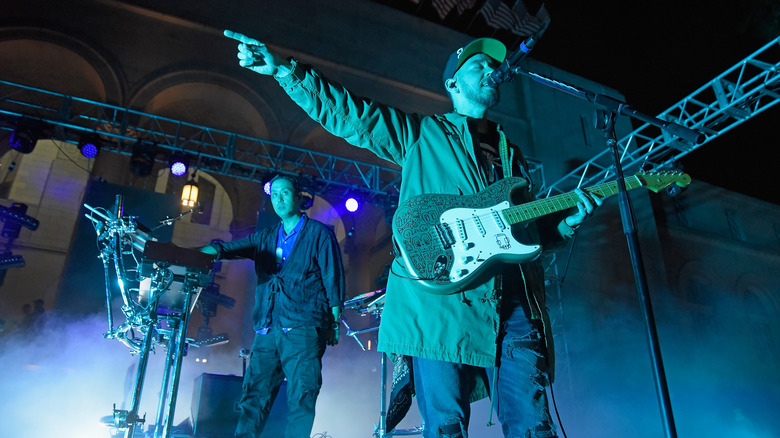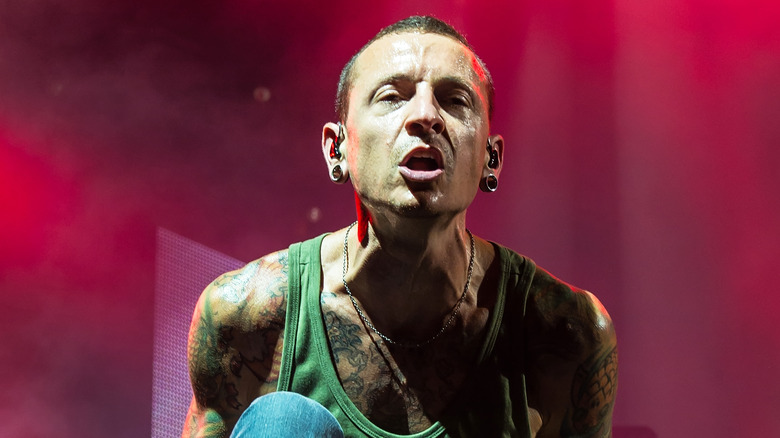The Untold Truth Of Linkin Park
As a band, Linkin Park has achieved unbelievable success across the world and is a name that's instantly recognizable for many fans who turn to iconic songs like "Numb," "Leave Out All The Rest," and "In The End" even today, many years after they were first released. As pointed out by All Music, Linkin Park definitely stands out for the fact that its music explores several genres at once and its members have not restricted themselves while creating music.
Linkin Park has a fairly interesting background. Guitarist Brad Delson, vocalist Mike Shinoda, and drummer Rob Bourdon were in the same high school in California, which is where they first met and decided to start a band called Xero in 1996. In a short period, the band grew after bassist Dave Farrell, DJ Joseph Hahn, and singer Mark Wakefield agreed to join the band. However, things were rough in the beginning and it was difficult for them to get noticed. It would take them a couple of years to get a breakthrough and find Chester Bennington.
This is the untold truth of Linkin Park.
Chester Bennington's entry was a surprise
Chester Bennington was originally with a band called Grey Daze, a group that helped him understand who he was. He said, "The relationship I had with that band was the first time I felt I had a connection with anybody. I knew those guys would back me up." According to music journalist Tom Bryant, Grey Daze did well locally in Phoenix but failed to make a mark at the national level. By the time Bennington was 22 years old, he was working in a digital services company and not thinking about music.
However, things changed when Mike Shinoda and his bandmates started looking for someone who could sing for them after Mark Wakefield left. Shinoda explained, "I never pretended I could carry the vocals on my own" and added that he had "great melodies" on his mind and needed to look for a singer who "could do them justice." One thing led to another and a record producer called Jeff Blue got to know about the band and contacted Bennington, telling him, "I'm going to give you your big break. I have a great band for you."
Bennington wasn't sure but gave it a shot anyway, recording his vocals for the band. Still, Shinoda and the rest of the gang didn't know whether Bennington would be a good fit and auditioned other musicians. Bennington felt awkward but stayed, not knowing that he was going to get the gig. His vocals on the band's demo were really hard to beat.
It took them time to figure out the band's name
Linkin Park was not the original name of the band. While its first iteration without Chester Bennington was called Xero, the lineup known today first used "Hybrid Theory," which was the name of their debut album, but couldn't proceed on account of legal hiccups. According to the book, "Linkin Park," by Greg Saulmon, Bennington was the one who thought of naming the band Lincoln Park. They decided to go with the name, which was a well-known spot in Santa Monica, California.
Per ABC News, Lincoln Park turned into Linkin Park so that it was easier for them to get their website up and running. They couldn't possibly afford the domain name that was already registered by someone else, though, so they decided to tweak the spelling a little because they were very keen on establishing their online presence. Mike Shinoda told Yahoo! Music, "We wanted our own website, 'cause our main channel to talk to our fans was on the web." They completely underestimated how important the name would be in the future.
David Farrell, also referred to as Phoenix, said at the ESPN Sports and Music Awards, "There's been radio stations in Chicago that have said, 'Here's this local band, from Chicago, Linkin Park' — and that's actually been happening all over the country ... in every major city you go there will be a Lincoln Park that's either a park, or a community ... For a while, everybody thought we were local, like a support act."
It was very difficult for them to launch their debut album
Linkin Park officially entered the music industry with their first album, "Hybrid Theory" in 2000 and ended up becoming popular in a short period: the album was declared a bestseller by the next year. However, the band members were hustling behind the scenes to make things happen, per Louder Sound. In fact, Mike Shinoda was even quoted as saying, "We did get a reputation for being a business rather than a band. But that was because we were so focused on getting our stuff done. It wasn't in the name of business – it was in the name of building up this thing we had worked so hard to create. We were prepared to do everything in our power to be successful on all levels."
Shinoda wasn't joking: Linkin Park didn't leave any stone unturned to get noticed by a label. Bennington recalled that nobody was keen on taking a chance with Linkin Park but the band members were confident about their potential. "We just kept pushing. Most bands probably try out in front of three labels, get rejected, and give up," Bennington said, adding that they auditioned in front of 45 labels and remained optimistic, knowing that something would work out.
Then a former A&R manager got a gig at Warner Bros., and chose to root for Linkin Park, giving the band the opportunity to launch their debut album.
A record label wanted Mike Shinoda to leave the band
What Linkin Park didn't know is that the band would have to work extra hard to maintain their integrity before the launch of "Hybrid Theory." According to Louder Sound, Mike Shinoda revealed that they "had to fight tooth and nail to maintain the vision of the record all the way through." He also mentioned that the label's stance was clear: they were waiting for Linkin Park to "impress them" in order to give the band the chance to work on an entire album.
Once again, the band members stayed true to their goal, not bowing down in front of the label. However, they were taken aback when the label tried to get rid of Mike Shinoda, something that was unacceptable to the band. Chester Bennington said, "These guys sat me down and were like, 'Oh, you've got such an amazing voice, you could be such a shining star.'" He added angrily, "They wanted to see if I would pull a coup to get Mike out."
The band didn't fall for it and were not happy when the label tried to replace Shinoda with a rapper from New York. Bennington was extremely angry about the incident and said, "Mike's one of the most productive songwriters of our era, I think. God knows how many Number Ones we've had, but if he wasn't in the band, we wouldn't have had any of those!"
They didn't want to be restricted to a label
Interestingly, Linkin Park was keen to establish an original sound instead of being categorized as a "nu-metal" band. According to the book, "Linkin Park" by Greg Saulmon, Mike Shinoda once said in an interview with a company called Native Instruments that Linkin Park genuinely didn't think too much about the new metal label and only tried to come up with songs that were appealing to the band members. Shinoda said, "Rather than writing to be part of a genre, we just write what we feel moved by."
According to The Guardian, Shinoda even said that if someone genuinely wants to get to know the band better, they should listen to their songs or check out their website and attend a show instead of trying to read about their work in magazines.
Chester Bennington offered some perspective when he said, "Every once in a while, you get someone who does something really new and original that no one's ever heard before and that's what makes music really great." Shinoda added that they were simply trying to create good music like everyone else in the industry.
They're known to be perfectionists while creating music
Linkin Park's band members didn't like doing things in a haphazard manner while making music and it was important for them to ensure that they were giving 100% while coming up with something new. A solid example, according to "Linkin Park" by Greg Saulmon, is their album "Meteora." They brainstormed over 50 song concepts for the album and kept working on them, eliminating the ones they weren't happy with until they narrowed down their options to 12 ideas.
Lead guitarist Bradford Delson told Yahoo Music! in an interview, "When we were writing, we definitely wanted to have 12 or 13 songs that relate to one another, and also sequence them in a way that takes the listener on a journey — not just within each song, but from the beginning of the album to the end." Also, the band didn't shy away from innovating and using technology to their advantage, something that's especially visible in their song "Somewhere I Belong."
Chester Bennington used his past experiences to write lyrics
As a musician, Chester Bennington often turned to his past to find inspiration. He didn't have a great childhood, according to "Linkin Park" by Greg Saulmon: His parents decided to get a divorce when he was 11 years old, something that scarred him. Bennington used coping mechanisms such as weed, and lost interest in academia and sports. High school was difficult: He lost one of his friends to suicide and another pal passed away in a skateboarding mishap. At this point, a young Chester Bennington found himself experimenting with other drugs.
As a member of Linkin Park, Chester Bennington wanted to be true to his emotions and write about his past. He did exactly that but allowed himself to be vague so that Mike Shinoda could relate to the lyrics as well. As Bennington explained, "I can't talk about this crappy thing that happened to me and expect him [Shinoda] to be able to sing it. It has to be vague enough for both of us to go, 'We can relate to it.'" Per Rolling Stone, Bennington considered "Crawling" to be "the most literal song" that he had written for the band. He said, "That's about feeling like I had no control over myself in terms of drugs and alcohol."
If you or anyone you know is struggling with addiction issues, help is available. Visit the Substance Abuse and Mental Health Services Administration website or contact SAMHSA's National Helpline at 1-800-662-HELP (4357).
They consciously chose to avoid using cuss words
It's true that many Linkin Park songs explored angst, grief, and pain. However, the band refused to indulge in profanity and chose to keep their songs as clean as possible. This was a conscious decision and Chester Bennington told Rolling Stone, "When Mike [Shinoda] and I sat down and wrote the lyrics [for 'Hybrid Theory'], we wanted to be as honest and open as we could ... We didn't want to make a big point of not cussing, but we don't have to hide behind anything to show how tough we can be." He added that they wanted to ensure that their listeners would be able to identify with the songs.
Shinoda admitted that they were afraid of opening up about their emotions but felt differently when they saw that their fans could relate to the music and they were not alone. He said, "We wanted to be a little more descriptive, instead of just going 'f***' all the time. We wanted to go into detail."
They didn't want to be celebrities
As a band, Linkin Park didn't aim for fame, at least not in the conventional sense. According to The Guardian, they knew that they were artists first and simply wanted to keep creating more art. Chester Bennington declared, "We aren't a manufacturer. We are artists, and we've gone philosophically back to where we were writing music before we sold a record. When we were excited about a song, not because..." Mike Shinoda finished the line for his friend and said, "...This is going to be a hit!"
This doesn't mean that they took their success for granted. They could clearly recall the moment they understood that they were getting noticed for their work: they were at Bennington's father's place when they heard a Linkin Park song on the radio for the first time. Shinoda described it as "the most surreal experience."
That said, fame wasn't easy to deal with and they found themselves being wary of the press, refusing to open up in interviews and being defensive. It took them time to feel comfortable and share anecdotes with the media. There were some issues along the way: For example, Chester Bennington had to deal with a stalker who ended up in jail after "cyber-invading his life" and accessing his personal photos and emails. Bennington said, "It's not fun to put someone in prison. Ninety-nine percent of fans are great. We're famous, but we're not celebrities."
The band has done a lot for causes it cares about
Linkin Park's members have stepped up when needed and lent their voice to important causes: they even started a charity organization called Music for Relief in a bid to reach out to others in need. A description on the group's page reads, "Music for Relief, a program of the Entertainment Industry Foundation, is dedicated to providing aid to survivors and communities affected by natural disasters to help them recover and rebuild." Music for Relief was created in 2005 and is meant to "support immediate and long-term disaster relief with a primary goal of making a powerful and sustainable impact in highly affected areas."
According to the book "Linkin Park," by Greg Saulmon, the band was heartbroken when a devastating tsunami struck in 2004, killing over 200,000 people and leaving millions of survivors homeless in India, parts of Africa, Thailand, Sri Lanka, and Indonesia. Linkin Park decided to do its bit and performed for charity and collaborated with the American Red Cross to start Music for Relief. They donated $1,00,000 and requested fans to chip in, raising $236.2 million to support those recovering from the tsunami.
Chester Bennington's death was a huge shock
On July 20, 2017, Linkin Park's band members and its fans woke up to devastating news: Chester Bennington had died by suicide. Per Rolling Stone, the musician went through an emotional rollercoaster before his death and "suffered a relapse" when he found himself drinking once again to cope with his demons. In 2018, Mark Shinoda opened up in an interview with The Guardian and said that he had learned to cope by "staying in motion." He did solo sets at music shows especially for Chester Bennington, honoring his friend's memory and singing with fans.
Shinoda came across a plethora of experiences: fans who couldn't help but tear up when they spoke to him, others who thanked him for his work. Shinoda said, "The sentiment is usually, 'Thank you for the music, thank you for carrying on, the new album is helping me, seeing you on stage lets me know that I can carry on.'" He explained that he really hoped that the tour would help fans and intended "for that to be a part of the message."
If you or someone you know is struggling with mental health, please contact the Crisis Text Line by texting HOME to 741741, call the National Alliance on Mental Illness helpline at 1-800-950-NAMI (6264), or visit the National Institute of Mental Health website.
The band isn't ready to tour yet
To the disappointment of many fans, Mike Shinoda said last year that Linkin Park was not comfortable with touring yet. According to Kerrang!, Shinoda offered an explanation and said that he is fine with the idea of touring, physically speaking but doesn't believe that it's the right time for the band to make a comeback. He said, "We don't have the focus on it. We don't have the math worked out. And I don't mean that by financially math, I mean that like emotional and creative math."
Shinoda also said that the band has a "certain bar" that they hope to achieve whenever they create music and things simply haven't worked out yet. Shinoda stated clearly, "For our band, anything that we do, it's like it's gotta be, it's gotta clear a certain bar. So there's no, nothing has cleared the bar."
